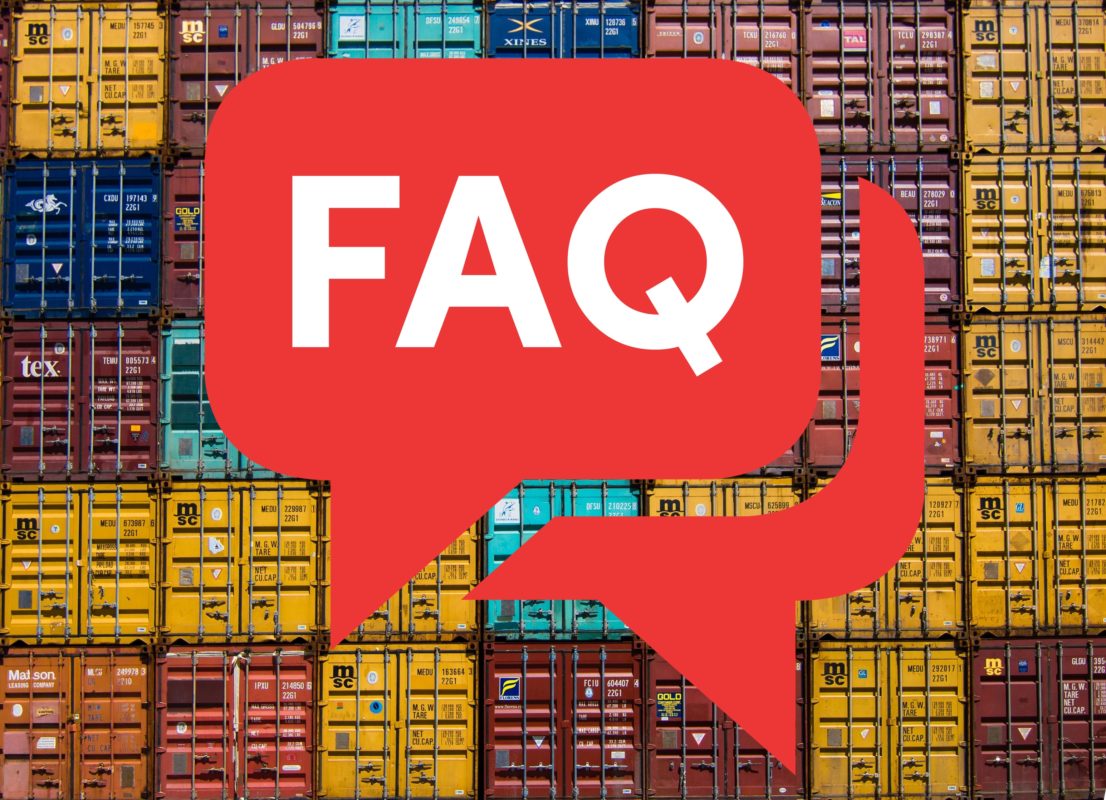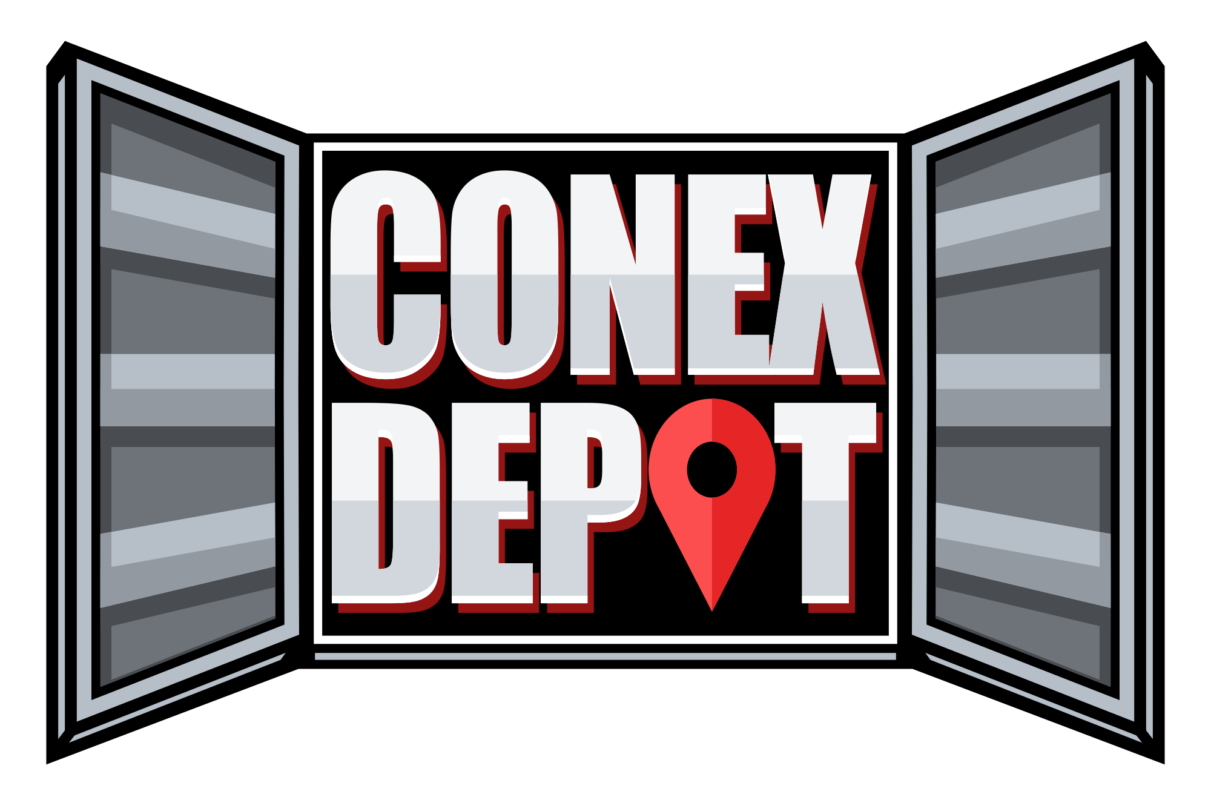Buyer’s FAQ

Buyer’s FAQ
How long from the time I order until delivery?
Our normal delivery time is 3-7 business days for stock that is on the ground and accessible in the depot. If you need your container sooner, we will do our best to accommodate your needs, but we suggest completing your purchase sooner than later to secure the truck delivery schedule. Delivery timelines for reserved inbound stock does vary due to shipment delays.
How much space is required for delivery?
Please take a few minutes to read our detailed delivery guidelines. For a 20FT storage container, you will need a minimum 60 feet of straight-line clearance. For a 40FT or 45FT storage container, you will need a minimum of 100 feet of straight-line clearance. Gate widths must be a minimum 10 feet and low hanging tree branches should be a minimum 14 feet, but additional clearance is needed at the drop location so that the truck bed can be raised up.
What type of truck is used to deliver a storage container?
We deliver all containers using tilt bed trucks and trailers that have the ability to place your storage container onto the ground. The truck bed or trailer is raised up until the end of the container is touching the ground. The truck is then slowly moved forward and the container gently slides off. Our highly experienced drivers have the ability to place your container exactly where you want it.
If you have the ability to unload a shipping container yourself using a forklift or crane please talk to your salesman, as we may be able to offer you a discount on the delivery fee, particularly if the unit is traveling long distance.
Is there any site preparation necessary?
The only thing you need to worry about is that the surface is fairly level, smooth, and firm. Our trucks can unload your container onto cement, pavement, asphalt or gravel, but we suggest placing pavers, concrete blocks or cut railroad ties under each corner to raise the container off the ground a little. This allows air to flow under the container and makes it easier to pick up if you ever need to move it.
What payment types do you accept?
Shipping container purchases must be paid for in full, prior to delivery. We accept both personal and business checks, Wire and ACH payments, Bank deposits, Visa and MasterCard, American Express, Discover Card and Zelle payments.
Do you offer discounts?
Yes, discounts are available to senior citizens, Military personnel (both active and retired) and federal government employees using the following coupon codes at the checkout:
SENIOR: 5% OFF order total
MILITARY: 5% OFF order total
GOVT: 5% OFF order total
Don’t qualify? No problem, you can still get a 2.9% discount off of your purchase by using one of our cash like payment options such as Check, ACH, Wire or bank deposit.
Can anyone own a shipping container? Do I need to register it?
Anyone can own a shipping container and no, it does not need to have the ownership transferred to you, nor does it need to be registered. You may wish to check with your local county if a storage container is allowed in your area though. The serial number printed on all four sides of the containers (the BIC code) is used to identify the unit during international shipping and storage in container ports.
Can you add a man door or roll up door?
Unfortunately Conex Depot cannot offer container modifications. The reason is because we sell at wholesale, so our containers are delivered direct from shipping containers port and depots where import and export container are stored. The good news is shipping containers are easy to modify yourself. Start a DIY project today!
My container doors won’t close properly. How do I fix this?
Placement of your container onto level ground is very important. If you cannot position it onto level ground you will need to level it after delivery. Containers that are not level will twist, which is a direct cause of doors not closing properly. Please review this video which shows how to level a shipping container using a floor jack.
Can I buy my own shipping container?
Yes, it is possible to buy your own shipping container. Shipping containers – both one trip and used – are sold by a variety of companies like Conex Depot that specialize in container sales, leasing, and modification. You can also find shipping containers for sale through online marketplaces like eBay, Amazon, and Craigslist.
Before you buy a shipping container, there are a few things to consider:
- Size: Shipping containers come in a variety of sizes, including 10′, 20′, and 40′ long. Choose a size that will fit your needs.
- Condition: Shipping containers come in new, used, and refurbished conditions. The condition of the container will affect the price.
- Location: Shipping containers are heavy and bulky, so you will need to arrange for transportation to your site.
- Permits: Depending on your local zoning laws and building codes, you may need to obtain permits before you can install a shipping container on your property.
- Modifications: If you plan to modify the container for a specific use, such as a workshop or living space, you will need to factor in the cost of modifications.
Once you have considered these factors and found a shipping container that meets your needs, you can purchase it and arrange for delivery to your site.
Can I buy a shipping container direct?
Yes, you can buy a shipping container directly from a shipping container company or supplier. Many companies specialize in the sale of shipping containers and can provide you with a wide range of options, including new or used containers, various sizes, and custom modifications. You can also find shipping container suppliers online or through local directories.
When buying a shipping container directly, it’s important to make sure that you are dealing with a reputable company. Look for a company that has a proven track record of supplying quality containers, offers clear and transparent pricing, and has good customer reviews.
Once you’ve found a supplier, you can discuss your needs and preferences with them, and they can help you choose the right container for your needs. They can also provide you with information about shipping and delivery options, and any additional services such as modifications or maintenance. Be sure to ask about warranties, returns policies, and any other questions you may have before making your purchase.
How Much Do Shipping Containers Cost in 2023?
The cost of shipping containers can vary depending on a number of factors, such as the size, condition, and location of the container. We can provide you with a general idea of the current market prices based on recent trends and historical data.
As of 2023, the cost of a new 20-foot shipping container can range from around $2,500 to $4,500, while a new 40-foot container can cost anywhere from $4,000 to $7,000. Used shipping containers are typically less expensive, with prices ranging from $1,500 to $3,500 for a 20-foot container, and $2,500 to $5,000 for a 40-foot container. However, prices for used containers can vary widely depending on their condition and age.
It’s worth noting that prices for shipping containers can also vary depending on location, as shipping costs can affect the price of the container. Additionally, modifications to the container can add to the overall cost. For example, adding windows, doors, or insulation can increase the price, while basic modifications such as painting or adding a lockbox may be included in the purchase price.
It’s worth noting that the price of shipping containers can also be affected by supply and demand, as well as other factors such as tariffs and global economic conditions. Additionally, modifications to the container, such as adding windows or insulation, can also increase the cost.
When purchasing a shipping container, it’s important to consider not just the upfront cost, but also any additional costs such as delivery and modification fees. Working with a reputable supplier can help you find the best quality container for your needs at a fair price.
It’s always a good idea to shop around and compare prices from multiple suppliers before making a purchase. This can help you get the best deal on a shipping container that meets your needs and budget.
How much does it cost to ship your own container?
Shipping containers are delivered from one location to another by truck. The average rate for moving containers is approximately $3 per mile—which calculates to $3,870.
The cost to ship your own container by truck can vary depending on several factors, such as the distance traveled, the size and weight of the container, and the type of cargo being transported. Other factors that may affect the cost include fuel prices, tolls, and the time of year.
As a general guideline, the cost to ship a standard 20-foot container by truck can range from $500 to $1,500, while the cost to ship a 40-foot container by truck can range from $800 to $2,000. However, it’s important to keep in mind that these prices can vary widely depending on the factors mentioned above.
When shipping your own container by truck, it’s also important to consider additional costs such as loading and unloading fees, permits, and escort fees for oversize loads. Working with a reputable trucking company can help you navigate these costs and find the most cost-effective shipping solution for your needs.
Can I put a shipping container on my land?
Yes, you can put a shipping container on your land, but there are several factors that you need to consider before doing so. Shipping containers are a versatile and durable option for a wide range of applications, from storage to housing and even retail spaces. However, there are some things to keep in mind when installing a shipping container on your property.
First, you need to check your local zoning laws and building codes to ensure that you are allowed to install a shipping container on your land. Some areas have specific regulations regarding the use of shipping containers, such as restrictions on the size and location of the container, and requirements for permits and inspections.
Once you have confirmed that you can install a shipping container on your land, you need to consider the placement of the container. Shipping containers are heavy and require a level and stable surface for installation. You may need to prepare the site by leveling the ground, adding a foundation, or reinforcing the ground to support the weight of the container.
It’s also important to consider the purpose of the container and any modifications that may be needed. If you plan to use the container for storage, you may not need any modifications, but if you plan to use it as a living space or retail space, you may need to add windows, doors, insulation, and other features.
Another factor to consider when installing a shipping container on your land is security. Shipping containers are inherently secure due to their sturdy construction and locking mechanisms, but you may want to consider adding additional security features such as alarms, locks, and security cameras.
Finally, you need to consider the cost of installing a shipping container on your land. The cost can vary depending on factors such as the size of the container, the location, and any modifications that need to be made.
In summary, it is possible to install a shipping container on your land, but it’s important to do your research and consider all the factors before doing so. Check your local regulations, prepare the site, consider the purpose and modifications, plan for security, and be prepared for the associated costs.
How long do shipping containers last?
Shipping containers are designed to be durable and long-lasting structures that can withstand the harsh conditions of the sea and long-distance transport. The lifespan of a shipping container can vary depending on several factors, such as the quality of the container, the conditions in which it is used, and the amount of maintenance it receives.
On average, a shipping container can last anywhere from 10 to 25 years with proper maintenance. However, some containers have been known to last up to 50 years or more. The key to extending the lifespan of a shipping container is proper care and maintenance.
One of the biggest factors affecting the lifespan of a shipping container is corrosion. Corrosion can occur when the steel used in the container is exposed to moisture and salt, which can cause rust and other forms of damage. To prevent corrosion, it’s important to keep the container dry and well-ventilated. Regular inspections and maintenance can also help catch and address any signs of corrosion before they worsen.
Another factor that can affect the lifespan of a shipping container is the conditions in which it is used. Containers that are exposed to extreme temperatures, high winds, and other harsh conditions may wear out more quickly than those used in more moderate conditions. Additionally, containers that are stacked or overloaded may be more prone to damage and wear and tear.
Proper maintenance can also help extend the lifespan of a shipping container. Regular inspections can help catch any signs of damage or wear and tear early, allowing for repairs to be made before the damage worsens. Cleaning the container regularly and addressing any issues with the locking mechanisms and other components can also help prevent damage and extend the lifespan of the container.
In summary, shipping containers can last anywhere from 10 to 25 years or more with proper maintenance and care. By taking steps to prevent corrosion, protecting the container from extreme conditions, and performing regular maintenance and repairs, you can help ensure that your shipping container lasts for as long as possible.
Are shipping containers waterproof?
Yes, shipping containers are designed to be waterproof.They are referred to as WWT – Wind and water Tight. They are typically constructed from high-grade steel and have welded seams that are designed to prevent water from entering the container. Additionally, the doors on shipping containers are designed to form a tight seal when closed, further preventing water from entering the container.
However, it’s important to note that not all shipping containers are created equal, and the level of waterproofing can vary depending on the container’s age, condition, and quality. Older containers may have rust or other damage that can compromise their waterproofing capabilities, while lower-quality containers may have weaker seams or doors that don’t form as tight of a seal.
Additionally, while shipping containers are designed to be waterproof, they are not necessarily designed to be completely airtight. This means that there may be some level of air exchange between the inside and outside of the container, which can affect the humidity levels inside the container. In some cases, this can lead to issues with condensation, which can cause damage to the contents of the container.
Overall, shipping containers are designed to be waterproof, but the level of waterproofing can vary depending on a variety of factors. If you are using a shipping container for storage or other purposes where water damage could be an issue, it’s important to ensure that the container is in good condition and that the doors form a tight seal when closed.
NEED MORE INFORMATION? CALL OUR SALES TEAM NOW ON (661) 412-2227



 Quick Quote
Quick Quote